

OUR IMPACT
by the numbers
OUR IMPACT
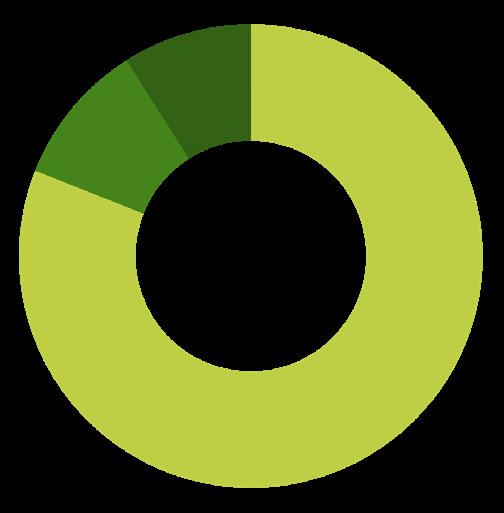
Oxfam is a global organization working to end the injustice of poverty and inequality by focusing on women’s rights. That’s why at Oxfam Canada, we work in three critical areas:
HUMANITARIAN RESPONSE
We provide emergency aid when disaster strikes or conflict breaks out.
Together with communities, we save and rebuild lives and support the needs of refugees around the world.
LONG-TERM DEVELOPMENT ADVOCACY &
We support projects that help people assert their rights and build better lives for themselves and their communities.

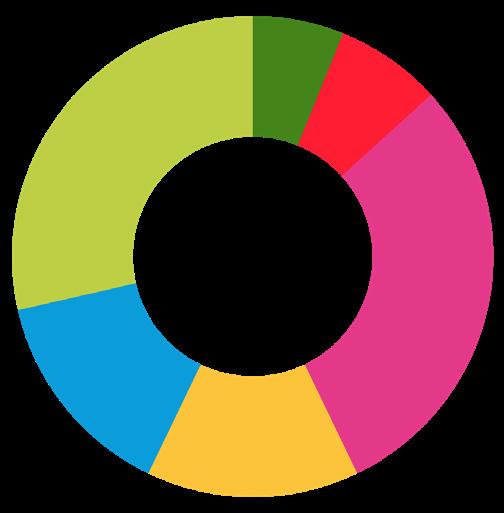
We work to change the laws and practices that perpetuate inequality and keep people trapped in poverty. We harness the power of people to change systems for the better.

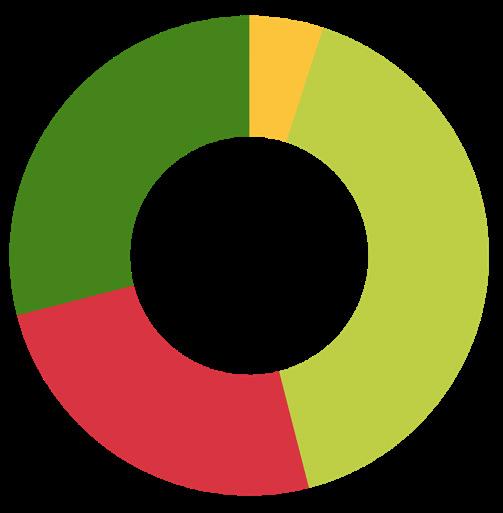
Our Program Spending Breakdown
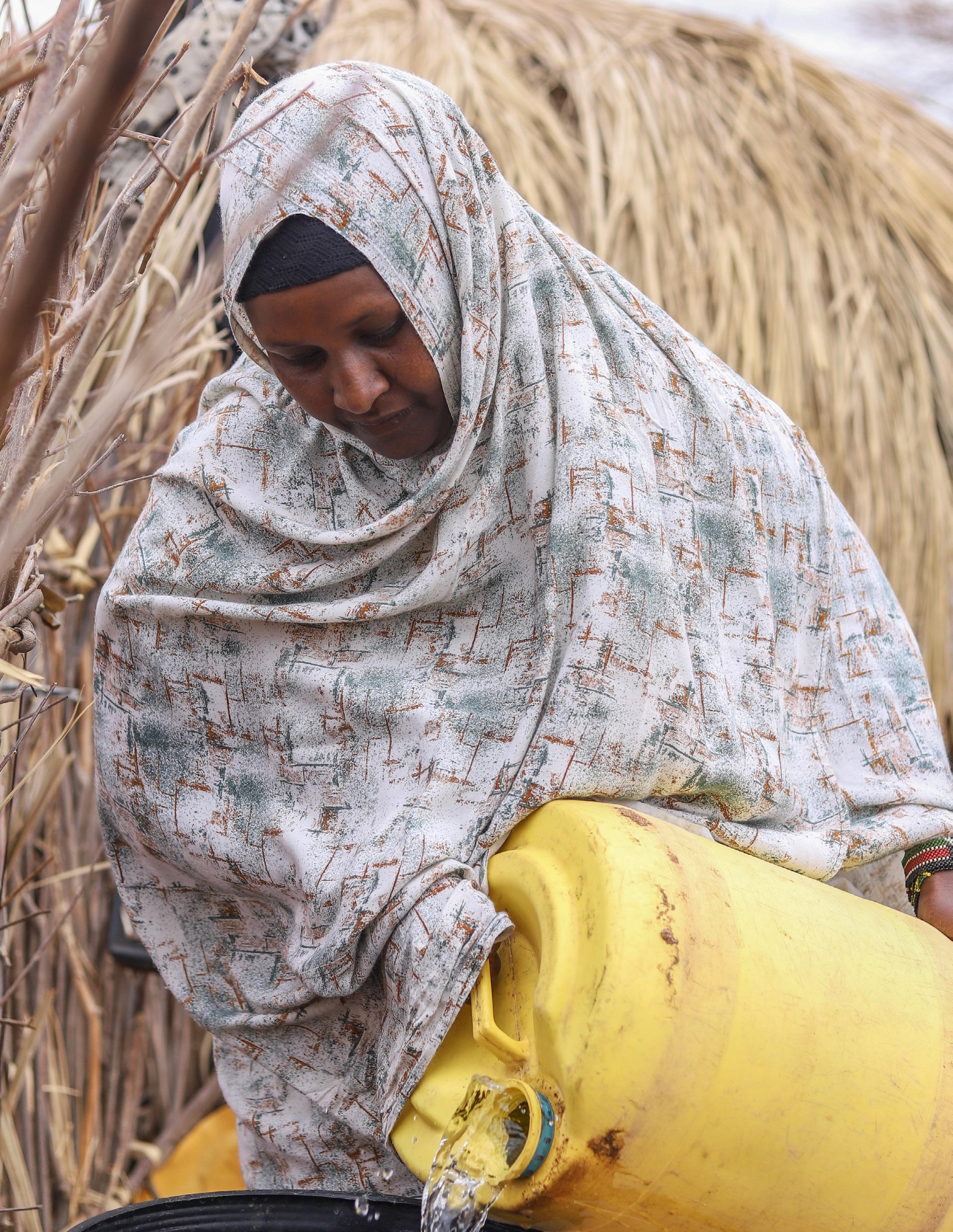
What we did
Responded to climate-induced disasters
We reached 522,995 people across 6 countries:
Mexico
Pakistan
Myanmar
Philippines
Somalia
emergency Response
We provide emergency aid when natural and climate-induced disasters strike or conflict breaks out, then stay for the long-term and work with local organizations to rebuild lives and support the needs of people and communities.
WASH results/activities
• 37,872 hygiene kits provided to crisis-affected communities
• 60,119 dignity/menstruation/intimate hygiene kits provided
• 28,932 people reached through hygiene promotion and awareness sessions
• 71,111 water kits/vouchers provided
• 194 water points (latrines, handwashing stations, water pumps, boreholes, etc.) rehabilitated, repaired, installed and upgraded, serving over 51,565 people
• Training and orientation of WASH community caretakers for maintenance and operation of water points
Emergency food & livelihoods
• Food/agricultural/garden/cooking kits including seeds, farming tools, cooking tools, crops provided to 8,242 people
• Supported 873 Micro, Small & Medium Enterprises (MSMEs) with small business grants and technical support
• Provided livestock vaccinations/treatments for 1,000 HH (6,210 people)
• Provided equipment to be used in livelihoods (for farmers, fisherfolk, carpenters, etc.) to 26,33 people
Protection & Gender in Emergencies
• Facilitated community-based protection training and awareness sessions for 25,341 people
• Supported 813 people in accessing SRH services
• Provided 49,145 people with shelter kits, of which almost half were winterization kits containing items specifically designed to protect vulnerable households from harsh winter conditions
• Supported the creation and development of safe spaces for women and girls in affected communities
• Provided support for 2,461 individuals to access referrals and consultations to protection services
Cash programming
• Distributed Multi-Purpose Cash Assistance (MPCA) to 76,695 people
• Distributed cash to 533 SGBV survivors
• Disbursed cash for work assistance to 5,414 people
• Disbursed cash for food & water assistance to 4,027 people
• Trained local women and men on gender in emergencies
Abdia, at an Oxfam water point in Kenya.
Photo: Eyeris Communications/Oxfam
Provided longer-term programming in fragile or conflict-affected areas
We reached 64,888 people across 6 countries:
PROGRAM RESULTS
Women Leading Durable Solutions
A project to promote equality by supporting women and girls in resisting damaging social norms and exclusion from decision-making spaces.
People reached life of project to date: 22,322 individuals
In year 2 of the program, three standout accomplishments emerged:
WASH results/activities
• Distributed 25,000 hygiene kits
• Distributed 22,617 dignity/menstrual health management/intimate hygiene kits
• Distributed 25,000 water kits/vouchers, including kits specifically designed to stop spread of cholera
• Facilitated hygiene promotion and awareness sessions
• 69 water points (latrines, handwashing stations, water pumps, boreholes, etc.) rehabilitated, repaired, installed and upgraded, serving over 22,322 people
• Creation, training and support of 35 communitybased WASH Committees for sustainability of services, maintenance and operations
Emergency food & livelihoods
• Supported 1,694 Micro, Small & Medium Enterprises (MSMEs) with small business grants, technical support, financial and business development support
Protection & Gender in Emergencies
• Facilitated community-based protection training and awareness sessions for 28,308 people
• Provided access to survivor-centred and traumainformed SGBV response services to 21,623 people (17,074 women and 4,549 girls), including access to contraception
• Creation and support in the development of 100 SelfHelp Groups (SHGs) for 2,000 women and girls, allowing them to initiate group savings and access protection mechanisms, and training them on protection, SGBV risks, safeguarding, referral pathways, financial management
• Provided support for 14,818 vulnerable individuals to access referrals and consultations to specialized services (medical assistance such as clinical management of rape, psychosocial support, legal aid, safe shelters, etc.)
Cash programming
• Specialized cash assistance for 6,734 SGBV survivors, or women and girls at risk of SGBV in order to help them access services safely, anonymously if needed
• Distributed Multi-Purpose Cash Assistance (MPCA) to 8,735 people
• Trained 4,327 women leaders, men and adolescent boys to facilitate women’s participation in decision-making spaces
• Trained more than 2,495 women on gender in emergencies
• Expansion of Women’s Leadership and Peer Learning Models: through the Gender Leadership Program (GLP), 109 women were trained. These women successfully facilitated multiplier sessions for 997 additional women, strengthening peer-to-peer learning, amplifying voices, and building leadership from the grassroots. This approach has shown early signs of transforming gender norms and fostering women-led collective action, particularly in camps for internally displaced people (IDP) and underserved villages.
• Water and Sanitation and Hygiene (WASH) Governance Structures Led by Women in Crisis-Affected Areas: WLDS formed 35 community WASH committees across 36 locations with 206 women and 113 men participating in gender and WASH training. This represents a breakthrough in women’s participation in community governance structures where they were previously excluded or hesitant to engage, especially in Rohingya communities.
• Rapid Adaptation to Cyclone Mocha and Evolving Protection Needs: in response to the devastation caused by Cyclone Mocha, WLDS pivoted to distribute 20,177 dignity kits to women and girls in 23 locations. Kits were tailored to meet context-specific hygiene needs and achieved a 96.5% satisfaction rate based on post-distribution monitoring. This emergency response demonstrated WLDS’s ability to integrate humanitarian response within longer-term gender equality objectives. We will support 50 women leaders to participate in policy discussions and decision-making spaces.

• 59 community awareness workshops facilitated for male champions across program locations.
• 1,190 individuals reached through community sensitization workshops on Gender Equality and Women’s Rights.
• Latrine cleaning kits provided in 7 targeted areas as part of WASH service restoration efforts.
• 62 latrines repaired or maintained across 3 IDP camps using a needs-based approach.
Outcomes
• At least 300 women, men, adolescent girls, and boys engaged through community-based workshops, stakeholder dialogues, and training for youth influencers on rights and leadership.
• GLP-trained women are actively sharing knowledge through peer sessions, strengthening community-level leadership and contributing to gender norm change.
• Male engagement and sensitization activities have led to initial positive shifts in community attitudes toward gender equality and reduction of harmful social norms.
• Communities have reported improved access to gendersensitive WASH services, with women beginning to take lead roles in decision-making within WASH structures.
Feminist Nexus Programming Is Essential in Crisis Settings: the integration of humanitarian, development, and peacebuilding (nexus) approaches enabled WLDS to respond rapidly to emergencies like Cyclone Mocha while advancing gender equality and leadership. This was made possible through strong adaptive management and partner-led learning, which improved the project’s resilience during times of conflict, natural disaster, and operational hurdles.
Investing in Women’s Confidence and Local Leadership Structures Has a Multiplier Effect: programs like the Gender Leadership Program (GLP) boosted women’s self-esteem and public voice, while embedding women into structures like WASH committees and protection groups created visible leadership pathways. These women-led platforms demonstrated long-term potential for sustaining community resilience and gender-responsive governance.
Male Engagement Is a Necessary Component for Gender Norm Transformation: contextualized male champion models were effective in challenging harmful gender norms and building community buy-in. Success depended on culturally appropriate messaging and inclusive facilitation to ensure support without reinforcing patriarchal dynamics.
PROGRAM RESULTS
Geared for Success
A project to champion education for refugees, internally displaced people, and host community children in South Sudan and Uganda.
People reached life of project to date: 442 individuals (162 women and 280 men) across South Sudan and Uganda, this included 125 Females and 195 Males in South Sudan and 37 Females and 85 Males in Uganda
In year 2 of the project, we have:
• Led capacity-strengthening workshops for 6 community-based organizations (CBOs) in Uganda & South Sudan, aimed at improving the organizational capacity of CBOs working in the education sector.
• Conducted a participatory research study on how to increase women’s leadership within CBOs by identifying barriers and actionable recommendations in both Uganda and South Sudan.
• Carried out research on the social norms, narratives, and myths surrounding refugees, displaced people, and education in both Uganda and South Sudan.
• Conducted a peace and conflict analysis in South Sudan, examining conflict drivers among refugees, internally displaced populations, and host communities. The study is currently ongoing in Uganda. Based on the findings, Oxfam will design training programs focused on peacebuilding, conflict management, mediation, dispute resolution, and risk reduction.
• Identified and engaged key influencers with the potential to be “champions” of CBOs working on genderresponsive education. Context-specific training modules were developed and implemented in both Uganda and South Sudan.
• Enhanced the ability of CBOs to continuously address the needs of schools and learners, particularly girls and learners with disabilities, through direct multi-year funding to local CBOs. Oxfam established a process to distribute core funding based on CBO’s identified needs, training CBOs on grant processes and financial compliance.
• Oxfam is now working on updating its Oxfam’s Gender Leadership Program (GLP) curriculum, which will be delivered to women in CBOs on human rights, peacebuilding, environmental stewardship, and conflict management. The program will also provide ongoing mentorship and support to women leaders within CBOs.
• Developed materials to raise awareness about barriers to gender-responsive education for refugees and IDPs, including key messages, fact sheets, and statistics on education barriers in Uganda and South Sudan.
• Held the Festival of Hope concert in Toronto featuring refugee artists to raise awareness about the importance of refugee education among the Canadian public.

Outputs Learnings
• 6 CBOs in Uganda and South Sudan completing CAT assessments and developing their own capacity strengthening action plans.
• 6 CBOS engaged in capacity strengthening training modules based on their action plans
• 2 Research reports produced and disseminated in Uganda and South Sudan (Formative participatory research)
• 1 sensitization session held with 15 males in one CBO in South Sudan to enable adoption of organizational policies and practices that promote women’s leadership
• 1 sensitization session held with 15 women in one CBO in South Sudan on effective leadership, gender equality, human rights, self-confidence, gender leadership.
• 6 CBOs received funding for organizational strengthening and gender-responsive education aligned with their action plans.
Outcomes
• In the first full year of implementation, the project does not yet expect or measure outcome results
Implementation to date has highlighted the importance of engaging community leaders and like-minded stakeholders in co-design. Their involvement offers valuable context, fosters community ownership, and strengthens project sustainability.
Capacity building is key to effective project delivery and empowers CBOs to provide transformative, gender-responsive education to refugee and host communities.
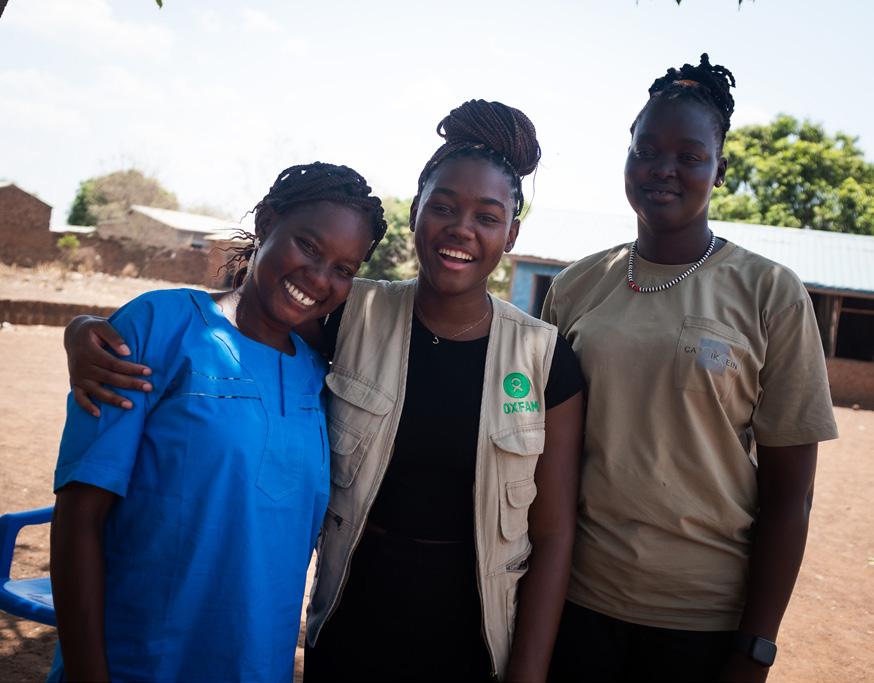
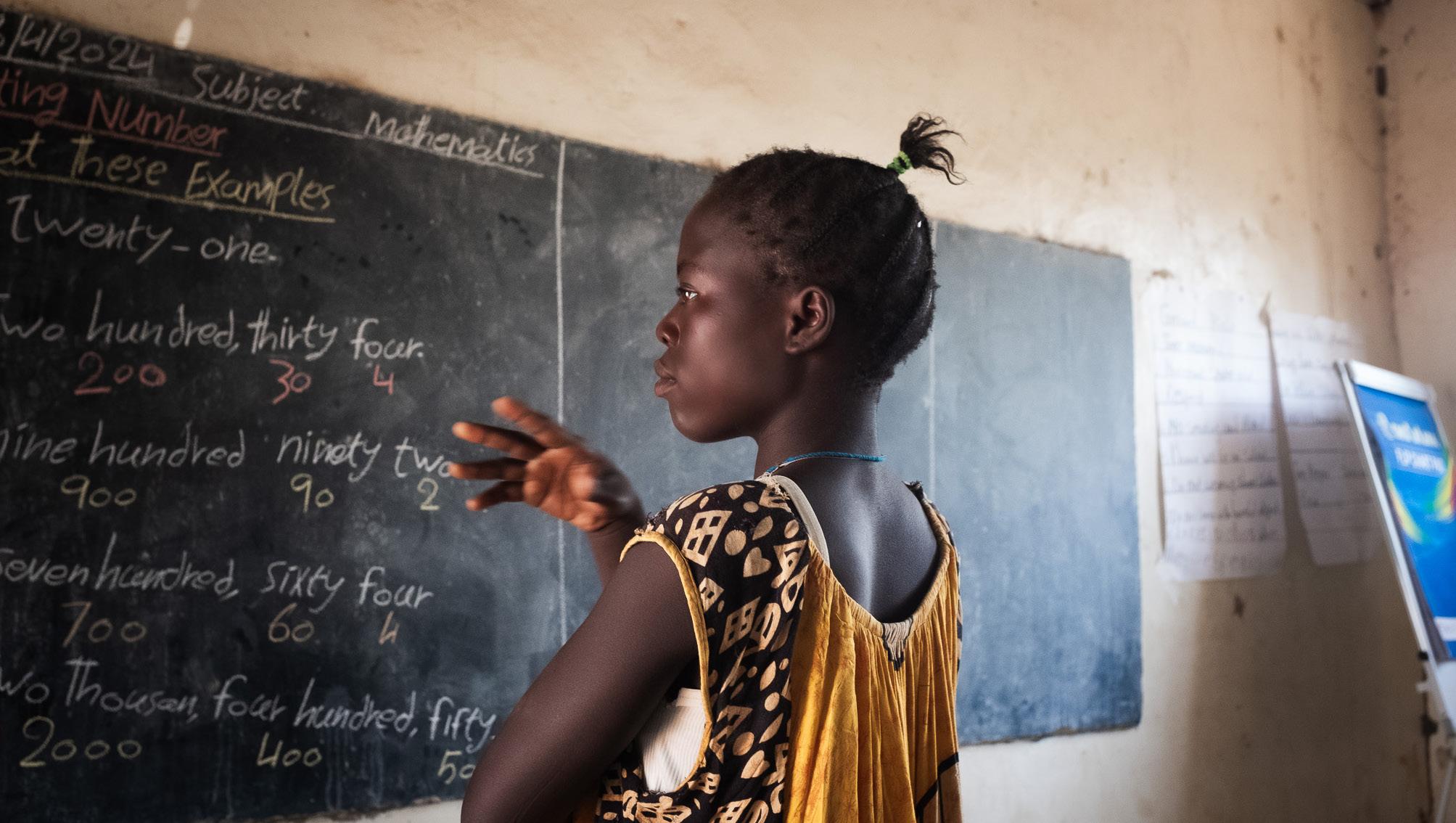
Provided humanitarian assistance in emergencies
619,371
WASH results/activities
• Provision of 28,562 hygiene kits to individuals, families and children
• Provision of 3,300 context-specific and culturally appropriate dignity/menstrual health management/ intimate hygiene kits
• 36,013 people reached through hygiene promotion and awareness sessions and activities, many of which were specifically targeting cholera prevention
• Distribution of 39,550 water kits containing water treatment chemicals, aqua tabs, etc.
• Rehabilitation, repair, installment and upgrade of 553 water points, serving around 167,562 people in various vulnerable communities
• Trained 222 individuals and supported creation of WASH Committees, along with providing them the support and tools to carry out maintenance and repairs of the water systems, handpumps, etc. to ensure the continuous supply of clean, safe water
Emergency food & livelihoods
• Distribution of food assistance to 5,500 vulnerable individuals/households
• Food/agricultural/garden/cooking kits including seeds, farming tools, cooking tools, crops provided to 15,705 people
• 143 micro, small and medium enterprises (MSMEs) received small business grants, essential specialized technical business support and sessions on improving knowledge on decent work standards
• Provided cash support to 100 micro-business owners (women and youth employees) that lost their jobs as a result of the market fire
• Provided equipment to be used in livelihoods (for farmers, fisherfolk, carpenters, etc.) to 2,770 people
Protection & Gender in Emergencies
• Facilitated community-based protection training and awareness sessions for 33,330 people
• Supported 174 people in accessing SRH services
• Distributed cash assistance to 750 SGBV survivors
• Distributed Multi-Purpose Cash Assistance (MPCA) to 69,228 people
• Disbursed cash for food & water assistance to 3,192 people

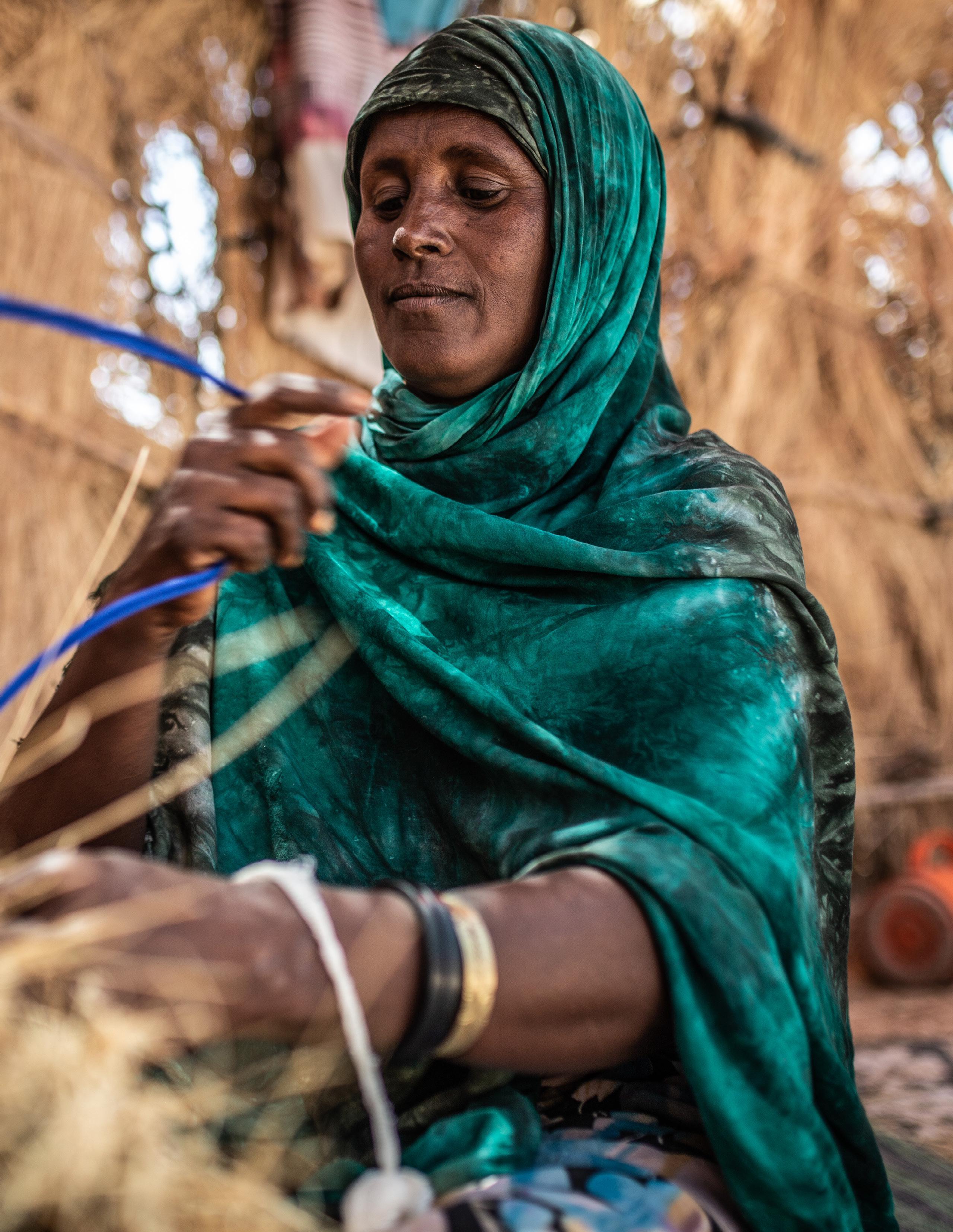
Long-term Development
We supported projects in 13 countries that help people assert their rights and build better lives for themselves and their communities. We work with local partners to develop long-lasting, farreaching solutions that enable people in poverty, especially women and girls, to provide for themselves, their families and their communities in a sustainable way. Because food security, safety, education and earning a decent living are rights, not privileges.
Anem weaves a basket in her community of Docoloha in Somaliland.
Photo: Pablo Tosco/Oxfam
What we did
WE Talk
A project to advance gender equality by preventing gender-based violence in Jamaica.
People reached life of project to date: 416
KEY ACHIEVEMENTS IN 2023-2024
Now in the second year, the project has reached a total of 27 organizations and 345 people (77% women) on preventing gender-based violence (GBV) and promoting positive masculinities. Highlights include:
• A review of initiatives throughout Jamaica that engaged men and boys in shifting mindsets and behaviours to prevent violence against women and girls, and to promote positive masculinities
• 3 workshops training women and youth influencers on their rights and building their confidence and leaderships skills
• 14 community focus group sessions to freely and safely discuss impacts of GBV on participants and their communities; as a result, many citing a renewed sense of empowerment to take up GBV advocacy.
• An analysis of how gender-based violence is represented in Jamaican digital media working with Quilt. AI. The analysis was widely disseminated, including in the media, highlighting the most pervasive and harmful beliefs that contribute to GBV.
• At least 300 women, men, adolescent girls and boys have been reached through community-based workshops, conversations with different stakeholders, and pilot workshops to train women and youth influencers on their rights.
• Awareness raising actions have reached at least 285 people through community-based workshops and conversations with different stakeholders.
• At least 30 women, men, adolescent girls and boy leaders have been reached through the 3 workshops pilot a new curriculum on GBV prevention.
WHAT’S NEXT
• Engagement sessions with male influencers to facilitate gender-sensitive and intergenerational dialogue on positive masculinities, preventing GBV, and challenges around achieving gender equality
• Community workshops with women and youth leaders to provide training on leadership, confidence and rights to self-advocacy
• Nation-wide media campaigns and advocacy initiatives
Learnings
Implementation to date has highlighted the importance of engaging community leaders and like-minded stakeholders in co-design. Their involvement offers valuable context, fosters community ownership, and strengthens project sustainability.
Capacity building is key to effective project delivery and empowers CBOs to provide transformative, gender-responsive education to refugee and host communities.
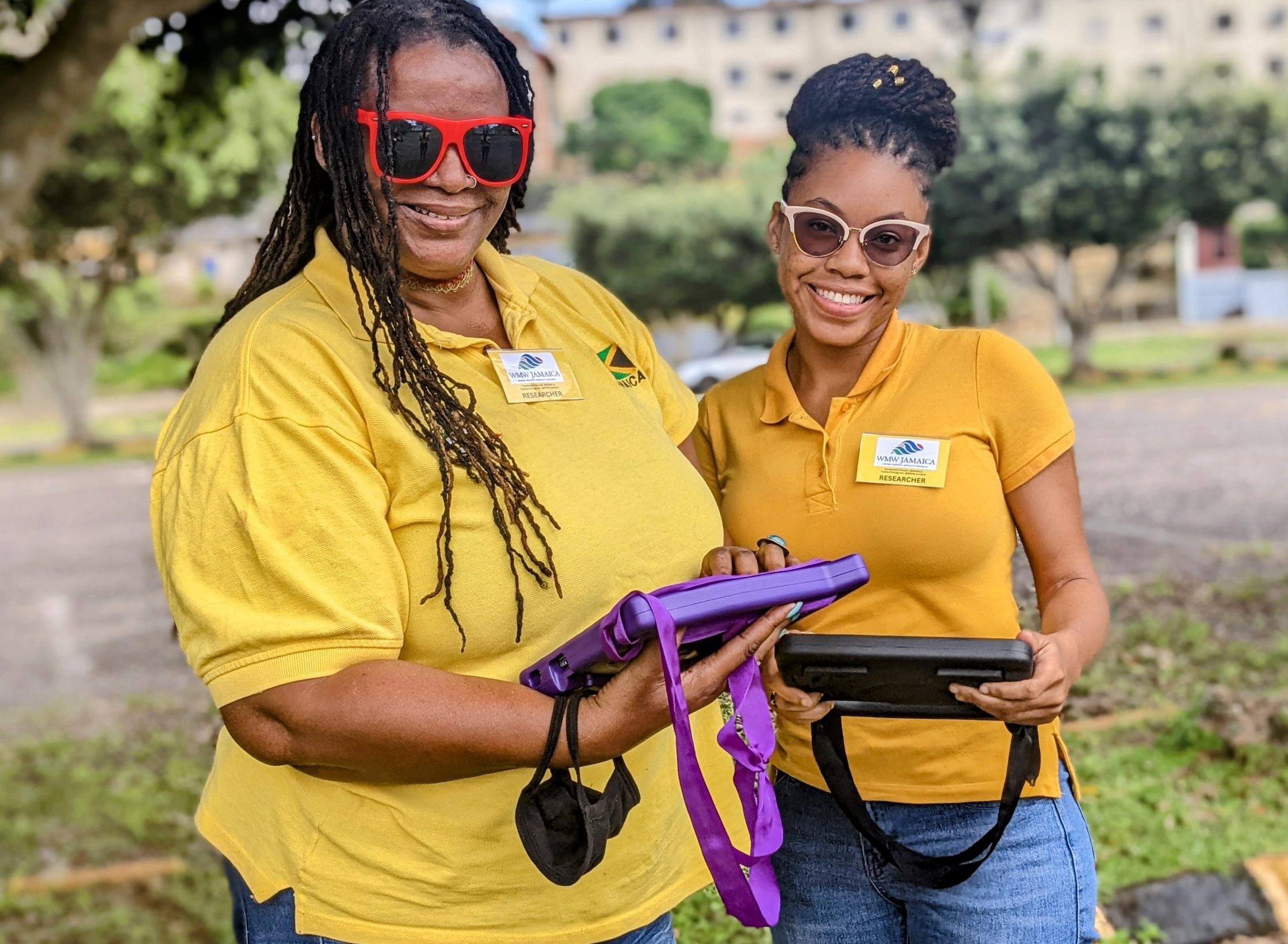
3 sessions which introduced attendees to the WE-Talk project, reviewed key baseline study findings, discussed key social norms driving GBV in Jamaica, reflected on potential participation barriers including care needs, and introduced feminist and participatory approaches.
9 alliance building activities
Stand Up for SRHR
A project championing the enjoyment of sexual and reproductive health and rights in Mozambique, Uganda, and Canada.
People reached life of project to date: The project has directly reached 35,343 adolescent girls, young women, and men with community-based SRHR information and services.
KEY ACHIEVEMENTS IN 2023-2024
Now in year three, the project reached 17,324 adolescent girls and young women with community-based SRHR services. Our activities increased awareness of SRH services, improved the quality of services and strengthened partners’ capacity to advocate for SRHR. Highlights include:
• 428 SRHR young peer educators trained across Uganda and Mozambique to raise awareness of SRHR
• #YourStoryMatters social media campaign on sexual and gender-bases violence reached over 40,000 people in Uganda
WHAT’S NEXT
• Trainings of peer educators and health practitioners in SRH services
• Mobile clinics in remote communities
• Strengthening capacity of partners and health centers to provide SRH services
• 6 Youth Friendly corners established – a safe space for young Ugandans to discuss SRHR issues
• 165 SRH practitioners (physicians, nurses, midwives, community health workers) trained on contraceptives provision and SGBV case protocols in Uganda and Mozambique
• 96 mobile clinics held to reach girls in underserved regions with SRH services
• Youth Summit in Ottawa building 23 young people’s skills to advocate for SRHR

Turnover of Peer Educators and Change Agents:
As the project progresses, several trained peer educators and change agents have exited due to reasons like graduation, early marriages, or unintended pregnancies. Both country teams are addressing this by recruiting and training new educators, including those outside the school system, and involving school staff more closely in mentorship and activities.
Out of School Youth in Uganda: Although the project in Uganda targets both school-going and community-based youth, out-of-school youth remain underrepresented. To address this, peer
educators are being encouraged to engage their out-of-school peers, which also helps with reach in harder-to-reach areas like Bukana subcounty.
Coordination with Partners across Pillars: The project has highlighted the importance of strong collaboration among partners to maximize impact, particularly in cross-cutting areas like referrals and health service linkage. To improve coordination, country teams have increased the frequency of meetings and undertaken mutual learning visits to each other’s sites.
Outputs
Outcomes
352,183 adolescent girls and young women reached through SRH services
48% of health facilities supported by Stand Up provided gender-responsive SRHR information and services.
69% of adolescent girls and young women receiving sexual and reproductive health services in health facilities were willing to recommend these services to their community.
39% of health facilities supported by Stand Up adopted protocols for the clinical management of SGBV services.
262,866 adolescent girls and young women reached through SRH services
43% of health facilities supported by Stand Up provided gender-responsive SRHR information and services.
18% of adolescent girls and young women receiving sexual and reproductive health services in health facilities were willing to recommend these services to their community.
64% of health facilities supported by Stand Up adopted protocols for the clinical management of SGBV services.

Learnings
Sexual Health and Empowerment – SHE
A project to change negative attitudes on sexual and reproductive health and advocate for women’s bodily autonomy and rights in the Philippines.
People reached life of project to date:SHE partners reached thus far 86,976 people of which 70.3% were women and girls.
KEY ACHIEVEMENTS IN 2023-2024
• 486 peer educators trained to raise awareness on SRHR and GBV prevention
• 36 male advocates trained as part of the Philippines 18Day Campaign to End Violence Against Women
• 585 women and girls provided with technical assistance on women’s participation in community structures, specifically by equipping them with the capacity and skills to identify gender issues in their community
WHAT’S NEXT
• Continued technical support and mentoring of peer educator groups and transition them to being independent organizations in their communities.
• Transferring all knowledge products to the Oxfam Pilipinas website to ensure access to the resources by everyone involved in the project.
Learnings
Engagement in local government is a great opportunity to promote SRHR and GBV prevention. During the 2023 local elections in the Philippines, some SHE-trained peer educators were either re-elected or newly elected as local officials in their communities. This created opportunities for the peer educators to advocate for the continued support of SHE activities.
Alliances and networks are crucial in sustaining the gains made in SRHR advocacy. SHE project partners have developed an extensive network of SRHR and GBV prevention advocates, which has enabled a supportive and conducive environment for advocacy, influencing work and collective action on SRHR.
• 162 sensitization and mobilization activities conducted together with influencers, municipal officials, local government unit officials, community-based organization leaders, and religious leaders
• 7 advocacy activities implemented, including technical assistance provided on the Prevention of Adolescent Pregnancy Bill, activities in support of the 16 Days of Activism Against Gender-Based Violence, and the publication of the Pasya Advocazine, which focused on the intersections of SRHR with key issues such as climate justice, comprehensive sexuality education, and the experiences of Indigenous women.

Outputs
162 community sensitization initiatives
17 LGU (local government units) with referral mechanisms in place for SRHR services
Outcomes
65,994 women of reproductive age accessed quality and gender sensitive reproductive health services including modern contraception
15 public declarations and actions by influencers to support SRHR, and in support of women’s rights and leadership
156 community sensitization initiatives
16 LGU (local government units) with referral mechanisms in place for SRHR services
49,034 women of reproductive age accessed quality and gender sensitive reproductive health services including modern contraception
75 public declarations and actions by influencers to support SRHR, and in support of women’s rights and leadership
2021-2022
38,720
100 Community Sensitization initiatives
16 LGU (local government units) with referral mechanisms in place for SRHR services
68033 individuals who have accessed quality and gender sensitive reproductive health services including modern contraception
39 public declarations and actions by influencers to support SRHR, and in support of women’s rights and leadership

A nurse examines a young pregnant woman in a SHE project area in the Philippines.
Photo: Basilio Sepe/Oxfam
Her Future Her Choice Camino Verde
A project to empower women and girls in sub-Saharan Africa to access more choices toward a brighter future.
People reached life of project to date: Now in year five, the project has thus far reached 316,724 people, of which 79% were women, throughout Ethiopia, Mozambique, Malawi, Zambia
KEY ACHIEVEMENTS IN 2023-2024
• 468 healthcare providers trained on providing SRH services
• 9,777 women and girls referred to SRH services
• 3,310 men and boys participated in workshops and groups discussions focused on promoting respectful relationships, consent and shared responsibility in family planning
Learnings People we worked with
Increased engagements with local governments have been vital for project success and local ownership of processes and results. In Ethiopia, for example, partners ensured local governments were involved in community structures, including the GBV committee, to ensure sustainability and disseminate best practices on topics like preventing child marriages.
WHAT’S NEXT
• Project wrap-up, including evaluation, ensuring sustainability of programs
553 facilitators and peer educators trained
725 teachers
Cholera outbreaks in countries like Zambia, Malawi and Mozambique created project delays, but encouraged project teams to review contingency planning, and improve crisis management skills and the application of a communication strategy to reach crisis-affected populations with SRHR information and services.
A project promoting the economic empowerment of Indigenous women and youth in Alta Verapaz, Guatemala.
People reached life of project to date: By the end of Year 5, Camino Verde reached more than 54,380 people, of which 72% are women.
KEY ACHIEVEMENTS IN 2023-2024
• 70 economic initiatives (47 women-led and 23 youthled) and 16 small-scale enterprises (12 women-led and 4 youth-led), benefitting over 6,550 Indigenous people, were supported in adopting climate adaptation practices and sustainable business models
• 194 young Indigenous people (91 young women and 103 young men) received financial and business development support
• 502 local authorities (286 women and 216 men) gained knowledge on women’s economic empowerment policies
• 1,154 local authorities (796 women and 358 men) gained knowledge on environmental sustainability policies
• 53 participants supported in land rights advocacy
• 385 individuals accessed market related support
• 6 new municipal policies supporting women’s economic empowerment
• 16 new small-scale businesses created and formalized
• 18,832 people (542 women, 9351 young women, 8716 young men, and 123 men) reached through awareness campaigns on Indigenous women’s and youth’s rights, including the right to live free from violence
Learnings
• As partners gained more experience in engaging on social media platforms for campaigns and awareness raising activities, they realized the dominance of TikTok over Facebook and other platforms in the Q’eqchi’ territory. This realization necessitated a shift in strategy towards producing lighter, shorter, and lower-cost content. This underscores the importance of adapting communication channels to the audience.
• Particularly during the electoral period, the Camino Verde team learned the importance of having robust security protocols and a clear route to obtain prompt legal assistance in cases of persecution or criminalization of partners. Given the political nature of the work in the communities, and the topics addressed by project partners such as SGBV, Indigenous women’s rights, protection of natural resources etc. being well-prepared for potential legal challenges is crucial.

2023 -2024
People we worked with 9,708
Outputs
Outcomes
2022 -2023
71% of whom are Indigenous 9,738
2,246 Indigenous women and youth trained in environmentally sustainable and climate resistant production practices
194 Indigenous women and youth sensitized on clean technologies and innovations for their economic undertakings
1 women led and 2 youth led enterprises have formalized their small-scale businesses
194 entrepreneurs, farmers and smallholders provided with financial or business development service
81% of whom are Indigenous
3,221 Indigenous women and youth trained in environmentally sustainable and climate resistant production practices
369 Indigenous women and youth sensitized on clean technologies and innovations for their economic undertakings
11 women led and 2 youth led enterprises have formalized their small-scale businesses
5288 entrepreneurs, farmers and small-holders provided with financial or business development service
SECURING RIGHTS FOR DOMESTIC WORKERS IN BANGLADESH
A project empowering women domestic workers in Bangladesh with information, skills and confidence to negotiate and secure labour protections.
People reached life of project to date: Now in its 5th year, the project has reached a total of 24,100 people directly and 16,515,663 people indirectly.
KEY ACHIEVEMENTS IN 2023-2024
• 3,146 domestic workers received life skills training and 3,081 domestic workers received occupational skills trainings
• 681 people attended National Conference of Domestic Workers
WHAT’S NEXT
• Increase sustainability of project impacts through national advocacy efforts in support of domestic workers’ rights.
• Strengthen Domestic Workers National Forum as a key platform for domestic workers’ rights.
• Continue life skills and occupational training and Rapid Care Analysis workshops with domestic worker families.
• Continue employer engagement to raise awareness and encourage action in support of domestic workers
• Final evaluation of project impacts and lessons learned.
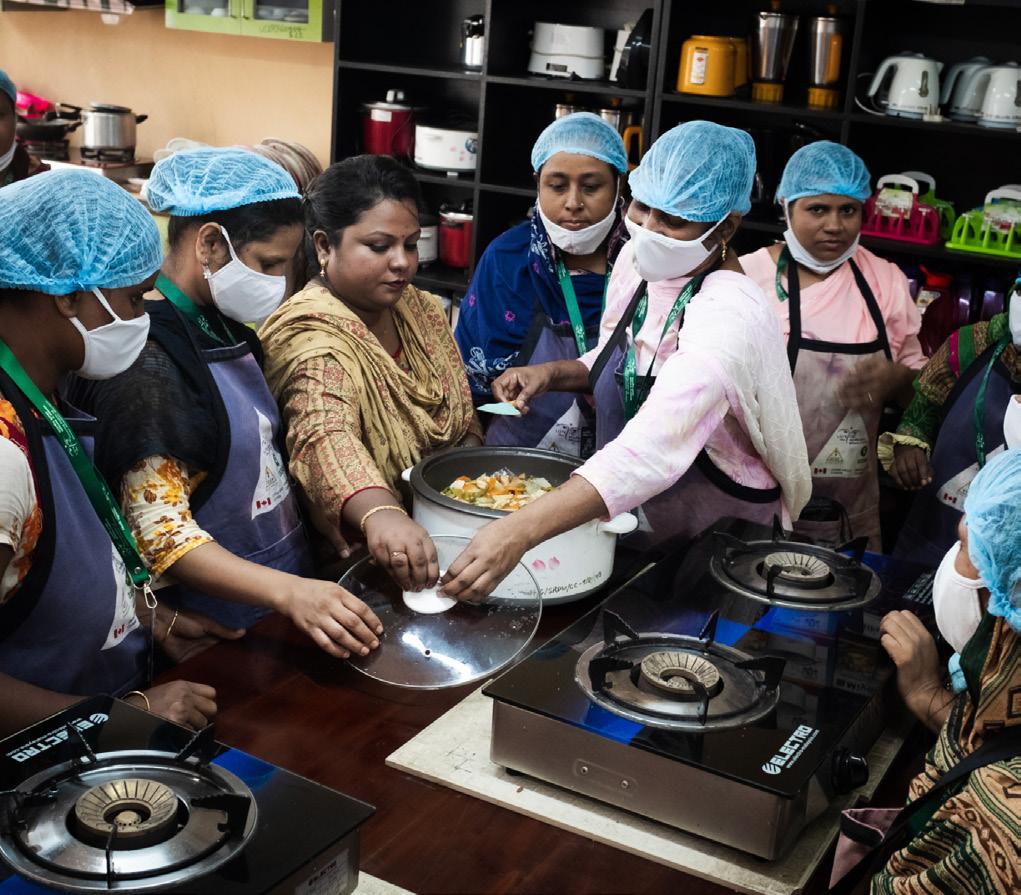
• 672 employers informed on the Domestic Worker Protection and Welfare Policy
• 13 public campaigns organized by domestic workers
• 80 domestic workers and their husbands were engaged on discussions of shared care responsibilities
• 16 Rapid Care Analysis workshops on unpaid care work were held
Learnings
Domestic workers reported that delays between the completion of initial training and the NSDA/ BTEB assessments often result in loss of knowledge, affecting their confidence and performance. Refresher trainings are therefore essential to reinforce learning, improve readiness for national certification, and support domestic workers in securing better employment opportunities. This insight has informed the inclusion of refresher trainings during the project’s extension period.
Following the March 2024 Korail slum fire, immediate cash assistance to affected domestic workers proved critical. Feedback emphasized the unique value of financial aid compared to in-kind support. This experience highlights the importance of a dedicated Rapid Response Fund to address future emergencies, which will be integrated into the upcoming extension period.
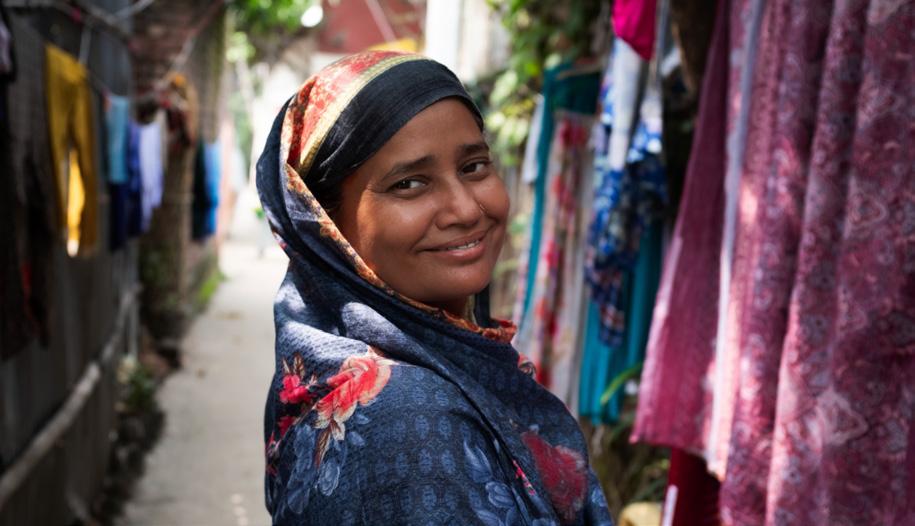
165 occupational skills trainings conducted 193 life skills workshops conducted
206 skills occupational trainings conducted 153 life skills workshops conducted
96% of domestic workers are satisfied with trainings received Outputs
360 trained women domestic workers linked for employment placement
98% of domestic workers satisfied with trainings received.
9,254
210 occupation trainings
339 workshops
Women’s Voice and Leadership – Pakistan
A project strengthening the leadership of local women’s rights organizations (WROs) to stop the human rights violations of women and girls in Pakistan.
People reached life of project to date: The direct beneficiaries for WVL projects are considered to be Women’s Rights Organizations (WROs) (rather than people). For WVL-P, they are 12 WROs, 5 women’s rights alliances as well as 22 responsive issue-based grantees and 18 research grantees. The 12 WROs reached a total of 228,501 persons. In addition, the social media outreach increased from 130,153 to 445,594 people during the project period.
450 trained women domestic workers linked for employment placement
75% domestic workers have heard about laws or policies to protect their rights
A Consultative Forum was formed
Note that some activities and therefore results are lower in FY24, because the project was winding down for close out. However, an extension was granted by the donor late in the year so the project will now continue to 2026.
KEY ACHIEVEMENTS OF THIS 5 YEAR PROJECT INCLUDE:
The highlights over the life of the project, which closed in 2024, include:
• WROs and alliances carried out coordinated campaigns for the 16 Days of Activism, National Women’s Day, International Human Rights Day, and International Women’s Day.
• Over the life of the project, four cycles of issuebased grants (22 in total) were delivered to support organizations on issues such as the gendered impacts of COVID-19, including GBV and psychosocial wellbeing; training community leaders; implementing social protection schemes; youth-led interventions on GBV and cybercrime; and enhancing women-led businesses and financial inclusion. These grants supported innovative initiatives of WROs who were not among the 12 core project partners.
• Production of a knowledge compendium with all of the 17 research reports funded by WVL-P so that the reports would be publicly available to government and civil society organizations interested in issues such as gender budgeting, changing gender norms in urban settings, women’s role in the arts and digital safety, among other topics.
• Development of a “Care Index” which sets a standard to measure the role of women in the care economy; the index can be used by WROs for their advocacy work with the government.
• Production of interactive learning game titled «Essentials of a Gender Just Organization,» which was disseminated among all 17 partners to use for staff inductions post WVL-P.
• Two-day refresher training on taxation, safety and security as well as first aid for the 12 core partner WROs.
• Creation of a webpage containing all project resources and impacts.16 Rapid Care Analysis workshops on unpaid care work were held
Learnings
The grant mechanisms for issue-based funding and research was too involved which led to delays in addressing immediate women’s rights issues. A more agile identification and approval process would have allowed for more meaningful engagement and quality monitoring with grantees.
The research grant funding could possibly have been more effectively administered locally through women’s rights alliances and networks. This approach could have significantly enhanced the ownership
and widespread dissemination of the grants and the knowledge produced.
The Capacity Assessment Tool 4 Gender Just Organizations proved to be the most effective tool to promote the process of transformation at the organizational level while the Gender Leadership Program proved to be the most effective way of promoting transformation at personal or staff level.
LGTBQI+ rights need to be incorporated into the Indigenous women’s rights approach that Tz’ununija’ implements if it wants to grow as a network that represents the interest of Indigenous women and youth.
The Rapid Response Fund (RRF) is an important mechanism that needs agile protocols for the protection and safeguarding of criminalized and/or persecuted Indigenous women’s rights defenders. During the project, the RRF was used to respond to different causes, from a humanitarian response
due to the pandemic at the start of the project, to a lengthy process for two criminalized and persecuted Indigenous women’s rights defenders to an emergency response to an injured individual during a violent land eviction.
An important balance needs to be set with capacity strengthening, project implementation, workloads and time for self-care and rest. Workloads were high due to translations needed across the project and approaches were not always conducive to self-care.
People we worked with 3,659 1,643
31 structures/systems implemented
2 advocacy/influencing strategy designed and implemented
17 Tz’ununija’ member WROs participate in decision-making spaces
22 WROs using best-practice and governance and management practices
17 structures/systems implemented
6 advocacy/influencing strategies designed and implemented
17 Tz’ununija’ member WROs participate in decision-making spaces
7 WROs now using best-practice governance and management practices

A project to strengthen paid and unpaid care work in Kenya to advance gender equality.
People reached life of project to date: 727 people (548 women, 179 men) were reached through the project in its first year of implementation.
KEY ACHIEVEMENTS IN 2023-2024:
In its first year, the project reached 727 people. Key achievements during this period include:
• The project partner Youth Alive Kenya (YAK) conducted male engagement sessions and facilitated the first-ever employer forum in Mombasa, creating spaces to advocate for decent work and improved conditions for care workers.
• Supported Kenya’s progress towards ratifying ILO Conventions C189 and C190 by engaging in the Ministry of Labour and Social Protection’s stakeholder processes.
• Contributed to the development of a roadmap for ratification of ILO Convention 189 (C189), that recognizes
WHAT’S NEXT
• Maintain a strong advocacy focus, including development of key messages for campaigns and community engagement to advance care-responsive policies and practices; county-based public participation in consultations for the adoption of the National Care Policy; advocacy for the ratification of C189 and C190 will also remain a priority.
• YAK will deepen community engagement through couples’ sessions and formalize the Employers’ Community of Practice to enhance advocacy and mobilization efforts.
• The project will initiate activities to mobilize care workers into Village Savings and Loans Associations which is intended to support financial empowerment.
• Research on how best to engage diverse care worker groups to be adapted for campaigns and community engagement initiatives.
• Mapping and strengthening institutions to support care economy initiatives.
• Training domestic workers on care work, life skills, and improving their employment opportunities.
domestic work as work and sets minimum standards of employment and participated in Labour Day celebrations where the President announced commitments to enhance workers’ welfare and labor rights.
• Contributed to the development and review of the draft National Care Policy by engaging in national consultation processes and technical committee reviews. Oxfam and its partners actively supported county-level public participation to ensure inclusive and responsive care policies.
• Partnered with Intellecap at the Africa Sankalp Summit to advocate for private sector engagement in the care economy.
Learnings
LGTBQI+ rights need to be incorporated into the Indigenous women’s rights approach that Tz’ununija’ implements if it wants to grow as a network that represents the interest of Indigenous women and youth.
The Rapid Response Fund (RRF) is an important mechanism that needs agile protocols for the protection and safeguarding of criminalized and/or persecuted Indigenous women’s rights defenders. During the project, the RRF was used to respond to different causes, from a humanitarian response due to the pandemic at the start of the project, to a lengthy process for two criminalized and persecuted Indigenous women’s rights defenders to an emergency response to an injured individual during a violent land eviction.
An important balance needs to be set with capacity strengthening, project implementation, workloads and time for self-care and rest. Workloads were high due to translations needed across the project and approaches were not always conducive to self-care.
2023 -2024 2022 -2023
